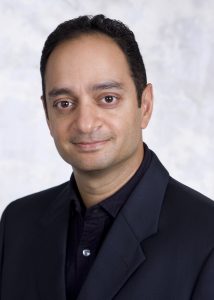New joint role brings biostatistical innovations to the fight against cancer
In January 2023, Professor J. Sunil Rao will join the University of Minnesota School of Public Health (SPH), with a co-appointment at the Masonic Cancer Center (MCC). Rao, who earned an MS in biostatistics at SPH in 1991 and his Ph.D. in biostatistics at the University of Toronto in 1994, is currently head of the Division of Biostatistics at the University of Miami’s Miller School of Medicine. It’s unusual for SPH to hire a full professor and Rao’s role as director of biostatistics at MCC marks a new direction for cancer research.

As a biostatistician, Rao is known for his pioneering work in developing new methods to glean vital information from an ever-expanding array of data sources to advance cancer prevention, detection, and treatment. As a junior professor at Case Western Reserve University, Rao was part of a team looking specifically for DNA methylation changes in stool that could be used as early detection markers for colon cancer. Later versions of the team’s work after Rao left were sold commercially and used to create Cologuard, the in-home colon cancer screening test.
“We’re extremely fortunate to have Professor Rao on our faculty,” says Joe Koopmeiners, professor and head of the SPH Division of Biostatistics. “He is an internationally recognized leader in innovative statistical methods for cancer research and he also has a deep dedication to giving students the best, most supportive experience possible. With his co-appointment at MCC, he’ll elevate data science as an essential component of cancer research.”
At MCC, Rao will lead a team of SPH faculty and staff biostatisticians in collaborative research with MCC investigators and deepen and expand MCC’s cancer-focused statistical methods research program.
“Dr. Rao has substantial expertise in analysis of large data sets and as advances in cancer research generates increasingly more information about our patients, he will lead our efforts in using this information to provide better patient care, improved clinical trial designs, and enhanced research analysis,” says Douglas Yee, director of the MCC.
Rao considers the SPH/MCC partnership at the cutting edge of what a few prominent cancer centers across the U.S. are doing — seeing data science as the next frontier for cancer research as it brings together data from genomics, other scientific fields, and the ever-expanding array of information from smart technology to open up a new way to understand the disease.
“Developing a portfolio of data-driven research with clinical colleagues and basic science researchers, and with strong involvement with harder-to-reach communities, can result in breakthroughs in cancer prevention, detection, and treatment, as well as strides toward greater health equity,” Rao says. “I’m looking forward to doing this work and making an impact — not just in my field, but, ultimately, in patient outcomes. I’m very excited to be joining a university steeped in a rich tradition of life-changing science where I will get the opportunity to work with world-class researchers from across the quantitative sciences and cancer research.”
Rao brings his own portfolio of statistical methods research focused on the analysis of high-dimensional data, machine learning, high-throughput modeling, and small area estimation, with applications to cancer and health disparities. Many of these methods have been recognized as significant advances in the statistical sciences. He is also the author of the forthcoming book, “Statistical Methods in Health Disparity Research” to be published in 2023, the first such book on the topic. Rao will be a valuable mentor to faculty and students, and contribute to SPH through his extensive experience in academic leadership.
